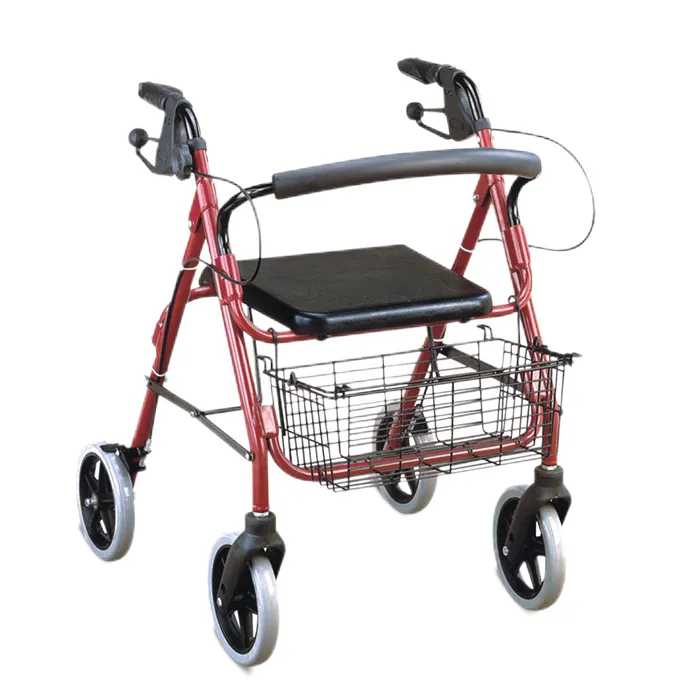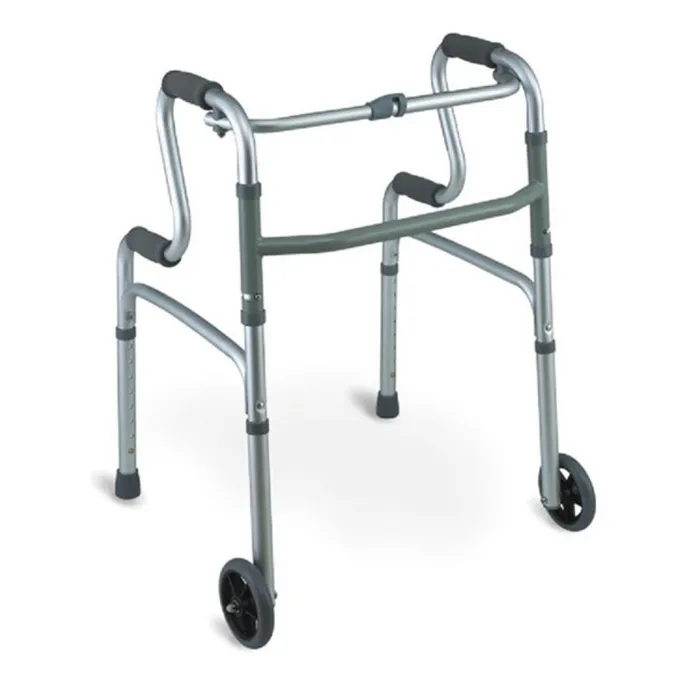In today's society, as people's awareness of mobility assistive devices continues to improve, the rollator walker, as a widely used assistive device, has become an important part of the daily life of many people with limited mobility. The rollator walker can provide users with balance support, enhance walking stability, reduce the risk of falling, and improve independence. However, not all people with limited mobility are suitable for using a rolling walker.
Regarding the question "Who should not use a rollator walker?", this article will start from a medical professional perspective, systematically analyze the categories of people who are not suitable for using a rollator walker, clarify the limitations of the rollator walker when using it, help users and their families make scientific judgments, and avoid new health risks caused by improper use.


What is the role of a rollator walker?
Before specifically explaining who is not suitable for using a rollator walker, it is necessary to clarify the basic functions of the rollator walker and the normal applicable population. Rollator walkers are usually made of lightweight metal materials. The structure includes handrails, support rods, wheels (some models may not have wheels), seats and other parts. The main functions are:
·Provide stability when walking;
·Support part of the body weight;
·Assist people with limited mobility to walk safely;
·Relieve fatigue when walking;
·Prevent falls.
Generally speaking, rollator walkers are suitable for people with weak muscle strength, poor sense of balance, unstable gait, reduced physical strength but still able to stand and move independently. However, once this scope of application is exceeded, rollator walkers may have negative effects and even increase health risks. Therefore, it is important to have a deep understanding of people who are not suitable for using rolling walkers.
Who should not use rollator walkers?
People who should not use the rollator walker:
1. People who are completely unable to stand or walk independently
2. People with blurred consciousness or severe cognitive impairment
3. People with extremely weak upper limb strength
4. People who need highly protective mobility support
5. People with severe motor coordination disorders
6. Patients with severe cardiopulmonary insufficiency
7. People with extremely abnormal body shape

1. People who are completely unable to stand or walk independently
The design premise of the rollator walker is that the user can stand independently and have a certain walking ability. For people who have completely lost the ability to stand or need whole-body support (such as severe paralysis, end-stage ALS patients), the rollator walker cannot provide sufficient support and protection.
·This group of people is more suitable for using full-support assistive devices such as wheelchairs;
·Forced use of rolling walkers can easily lead to falls and secondary injuries;
·The rolling walker cannot meet all the support needs of the body and has serious safety hazards.
2. People with blurred consciousness or severe cognitive impairment
The correct use of the rollator walker requires certain cognitive abilities, such as judging the route, operating the brakes, and adjusting the gait. If the user has severe cognitive impairment, such as:
· Patients with advanced Alzheimer's disease;
· Severe sequelae of brain injury;
· People with confusion and easy disorientation;
Then even if the physical function is still good, the rollator walker should not be used. Because the misoperation caused by insufficient cognitive ability (such as failure to brake correctly, choosing an inappropriate walking route) will greatly increase the risk of falling and injury.
3. People with extremely weak upper limb strength
Although the rolling walker mainly supports lower limb walking, in the process of pushing the rolling walker, the arms, palms and shoulders need to continue to exert force to control the direction and stability. If the user has the following conditions:
· Severe upper limb muscle weakness;
· Severe shoulder or wrist damage or postoperative recovery period;
· Upper limb dysfunction caused by neuromuscular disease;
Then they will not be able to effectively control the rollator walker, which may cause loss of control or fall. Therefore, people with extremely weak upper limb strength are not suitable for using the rollator walker, especially when using a wheeled rolling walker, which is more dangerous.
4. People who need highly protective mobility support
Some patients with certain diseases need continuous, highly protective support and care when walking, such as:
·Patients in the early recovery stage of stroke (who do not yet have basic walking ability);
·People with severe osteoporosis and are very prone to fractures;
·Patients with severe Parkinson's disease (often accompanied by sudden falls).
These people may fall suddenly or fall without warning during walking. Rolling walkers cannot provide immediate and comprehensive protection in this situation. In contrast, gait assist belts, professional care equipment or caregivers are more appropriate.
5. People with severe motor coordination disorders
Patients with motor coordination disorders (such as cerebellar ataxia and late-stage multiple sclerosis) have obvious involuntary movements and abnormal gait when walking. Relying on a rollator walker cannot fundamentally improve their motor disorders. Instead, the rollator walker may lose control due to uncoordinated pushing movements, resulting in falls or injuries.
Such patients cannot properly control the rhythm and direction of the rolling walker when using it, so it is not recommended to use a rolling walker. Instead, they should choose a more appropriate auxiliary method according to the doctor's advice.
6. Patients with severe cardiopulmonary insufficiency
Although the rollator walker can reduce the burden on the lower limbs, walking itself still requires a certain amount of physical strength and respiratory support. For patients with severe heart failure, advanced chronic obstructive pulmonary disease (COPD) and other diseases:
· Every small walk will cause shortness of breath and irregular heart rate;
· The rollator walker cannot effectively solve the problem of insufficient physical strength;
· On the contrary, it is easy to cause syncope or cardiac events due to excessive fatigue and insufficient oxygen supply.
Therefore, such patients should carefully choose the walking method and determine whether they are suitable for the use of the rollator walker after evaluation by professional medical personnel.
7. People with extremely deviated body shapes
The structural design of the rollator walker is usually based on the average body shape standard (height range 150cm-190cm, weight range 40kg-120kg). For:
·People who are extremely tall or short;
·People who are extremely obese (such as BMI over 40);
Regular rolling walkers on the market may not meet their stability and load-bearing requirements. Even reinforced rolling walkers are difficult to guarantee complete safety. Therefore, people with extremely deviated body shapes are not recommended to use them easily unless they have specially customized rolling walkers.

Professional evaluation should be conducted before using the rollator walker
Based on the above situations where the rollator walker is not suitable, it can be made clear that the rolling walker is not a "universal" auxiliary tool. Before deciding to use the rolling walker, professional evaluations should be conducted in the following aspects:
·Physical function assessment: including muscle strength test, joint range of motion test, balance ability test, and endurance test.
·Cognitive function assessment: ensure that the patient can understand and correctly operate the rolling walker, and can independently complete actions such as pushing, braking, and turning.
·Psychological state assessment: confirm that the patient has sufficient initiative and safety awareness to avoid failure due to over-reliance or fear.
·Environmental adaptability assessment: Is the home environment suitable for the use of rolling walkers, such as flat ground, sufficient space, and obstacles. Only after comprehensive assessment and confirmation of suitability can a rolling walker be equipped to ensure safety and practicality.
What are the benefits of buying from a Chinese manufacturer like Yikang Medical?
Purchasing from Yikang Medical provides several advantages, including cost savings, high-quality products, and customization options. As a reliable Chinese manufacturer, we are able to offer affordable pricing without compromising on quality. With certifications such as CE, FDA, and ISO13485, our products meet international standards. We also provide bulk purchase discounts, timely deliveries, and excellent after-sales support to ensure your complete satisfaction.

